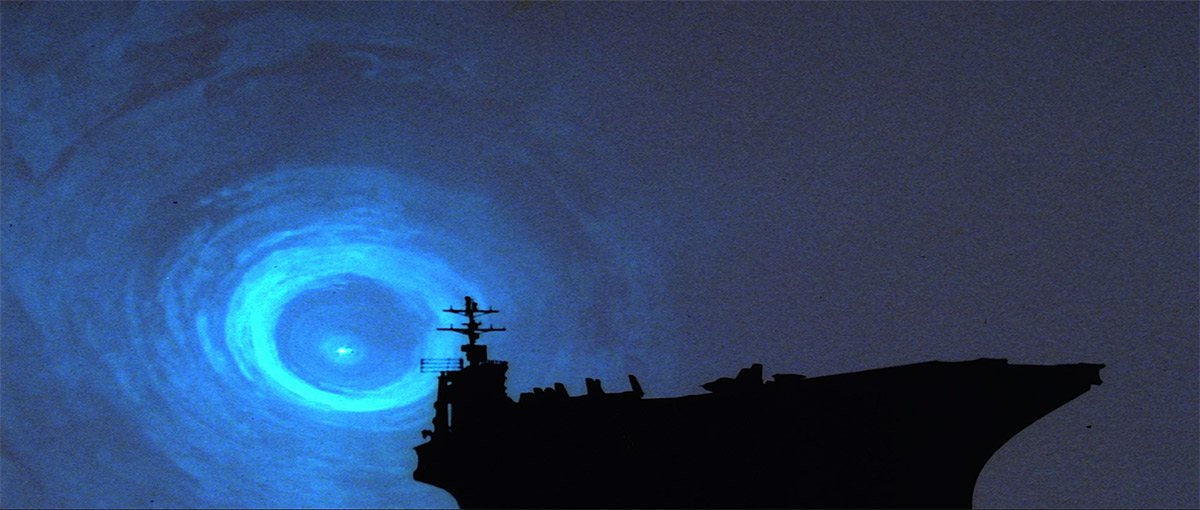War films crossed with science fiction don’t always make for the most cohesive of efforts, but the combinations are often at least interesting experiments in cinematic storytelling worth studying, from the bombastic (Independence Day), to the banal (Battle: Los Angeles). The Final Countdown is a curious amalgam that aims for a more high-minded philosophical approach, while still remaining grounded in classic naval adventure trappings. Though not as famous as other classic Navy movies, there’s enough interesting pieces that warrants a revisit.
In The Final Countdown, a US Navy Aircraft carrier on routine maneuvers in the Pacific encounters a mysterious anomaly that ends up sending the ship back in time. The crew slowly realize that they have been transported to December 6th, 1941, one day before the attack on Pear Harbor by the Japanese Imperial Fleet that pushed America into WWII.
online pharmacy order zovirax online best drugstore for you
Kirk Douglas stars as Captain Captain Yelland, the commander of the carrier, with Martin Sheen co-staring as Warren Lasky, a civilian Department of Defense observer and analyst.
Once the crew begins to understand the reality and gravity of their situation, the command must weigh the virtually incomprehensible consequences of how to proceed. The XO (played by theater and Balxploitation star Ron O’Neal) is resolute in engaging the oncoming Japanese fleet, as they are a warship pledged to defend the nation from all enemies, regardless of time and space. Lasky concurs, marveling at the cosmic opportunity before them.
online pharmacy order lexapro online best drugstore for you
Vehemently opposed to any action is Commander Owens (James Farentino), an amateur historian who understands full well the implications of altering history as we know it.
The situation is further complicated when the crew rescues Senator Samuel Chapman and his aide Laurel from a Japanese fighter plane attack, also capturing the downed pilot in the process.
The Final Countdown poses some very thought-provoking questions about the nature of time travel and cause and effect. How strange it is then that a heavy amount of screen time is instead devoted to showing off the might of US Navy. During early development of the film, the Department Of Defense became involved, offering financial and logistical support. The movie itself is filmed on the real world USS Nimitz, a nuclear powered super carrier that was the premier vessel of its day. As well, most of the sailors seen on film are actual crew members of the carrier, listed as such in the credits. The DoD and Hollywood have had a long history of cooperation since the early days of cinema, so while this venture is nothing new, the promotion is laid on rather thick for a story that itself involves very little kinetic action in its central dramatic conceit. Even so, the exhilarating footage of the aircraft launches, recoveries, and hundreds of crew hands hustling and bustling with all manner of munitions at least reinforces the idea of the Nimitz being powerful enough to destroy the entire enemy fleet single-handedly, an impact whose ripples in time could irrevocably alter reality as we know it.
The Final Countdown is not the only military film to address the theoretical conundrum of time travel. Most people remember 1984’s The Philadelphia Experiment, but the 1979 Japanese film Sengoku Jieitai/G.I. Samurai/Time Slip also covers this territory, showing the more visceral immediate consequences of soldiers going back in and time intervening with history. That movie received a remake in 2005, but in the same year came a South Korean film loosely based on/inspired by the 1979 original called Heaven’s Soldiers, which added a more comedic tone to its proceedings and an interesting time paradox involving a famous figure on Korean history.
Overall, The Final Countdown feels less like a feature length epic and more like a provocative short story or a great episode of The Twilight Zone. This isn’t necessarily a problem, but one should adjust expectations accordingly if they are expecting anything close to a rousing battle at sea. Despite those shortcomings, there is merit in a war film chooses to explore deeper philosophical points, as well as one that serves as a critical thinking exercise in how the military decision making process might play out in the most unlikely of situations.









